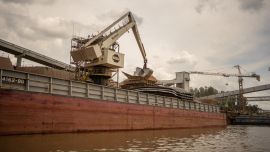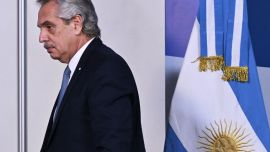Today marks a year since the first case of Covid-19 was recorded in Argentina, but with difficulties in securing vaccine deals and the surfacing of the VIP vaccine scandal, the pandemic is far from over.
On March 3, 2020, then-health minister Ginés González García announced the first case of the novel coronavirus had entered the country via 43-year-old businessman Claudio Ariel Pazzi, who had recently returned from a trip to Europe.
Just four days later, on March 7, the first fatality was recorded in a 64-year-old man. Since then more than 52,000 others have lost their lives, while today Argentina has registered more than 2.118 million infections.
Despite those figures, Argentina’s official death toll remains relatively low when compared with some European countries and neighbouring giant Brazil, at least in part due to the country’s lengthy and swiftly implemented national quarantine.
On March 19, in an address to the nation, President Alberto Fernández ordered a “preventative and compulsory” lockdown across the nation, permitting citizens to leave their homes only for essential services such as trips to supermarkets and pharmacies. At this stage, there were 128 positive cases in the country.
However, the strict measures met with strong opposition from sectors of the opposition and population. On May 25, Argentina saw its first anti-lockdown protest, when around 150 demonstrators attended a rally at the Plaza de Mayo, calling for restrictions on movement to be lifted and the economy to be re-opened.
On June 4, President Fernández announced that quarantine measures were to be ended in 18 provinces, with social distancing and certain health protocols in place. A strict lockdown remained in the Buenos Aires Metropolitan area (AMBA) — which includes the capital and its heavily populated periphery — until November 7, when the region moved into a new phase of Social, Preventive and Obligatory Distancing (DISPO).
The restrictions weren’t always observed, however. Shortly to follow was the death of legendary footballer Diego Maradona on November 25, and the subsequent mass public wake that followed, attended by tens of thousands at the Casa Rosada, drew criticism from some in the opposition, given the slight rise in coronavirus cases recorded since October.
Large public gatherings soon proved even more difficult to contain when thousands began flocking to beach resorts in summer months, leading the president to call on "all Argentines and especially the youngest" to "understand that they are vectors of transmission for the contagion" of the coronavirus.
By now, attempts to secure Covid-19 vaccines had accelerated, as nations across the world fought for crucial shots. On December 24, the first 300,000 doses of the Sputnik V vaccine, developed by the Russian laboratory Gamaleya, arrived at Ezeiza international airport. Since then, the government has managed to acquire four million doses of various types.
Tensions around vaccines accelerated further after the country learnt that politicians, government allies and their relatives obtained "vaccinations of privilege" out of turn. The revelations, known as the “VIP vaccine Scandal,” led to González García’s resignation on February 20, with ex-health access secretary Carla Vizzotti taking his place at the head of the portfolio.
While anger and outrage over the scandal remains, recent weeks have shown Argentina moving towards something closer to normality. With millions of children across the country now in the process of returning to schools for the first time in close to a year, and a slow but steady drip of vaccines arriving in the country, some are beginning to dream that the end of the virus crisis is creeping closer by the day.




















Comments